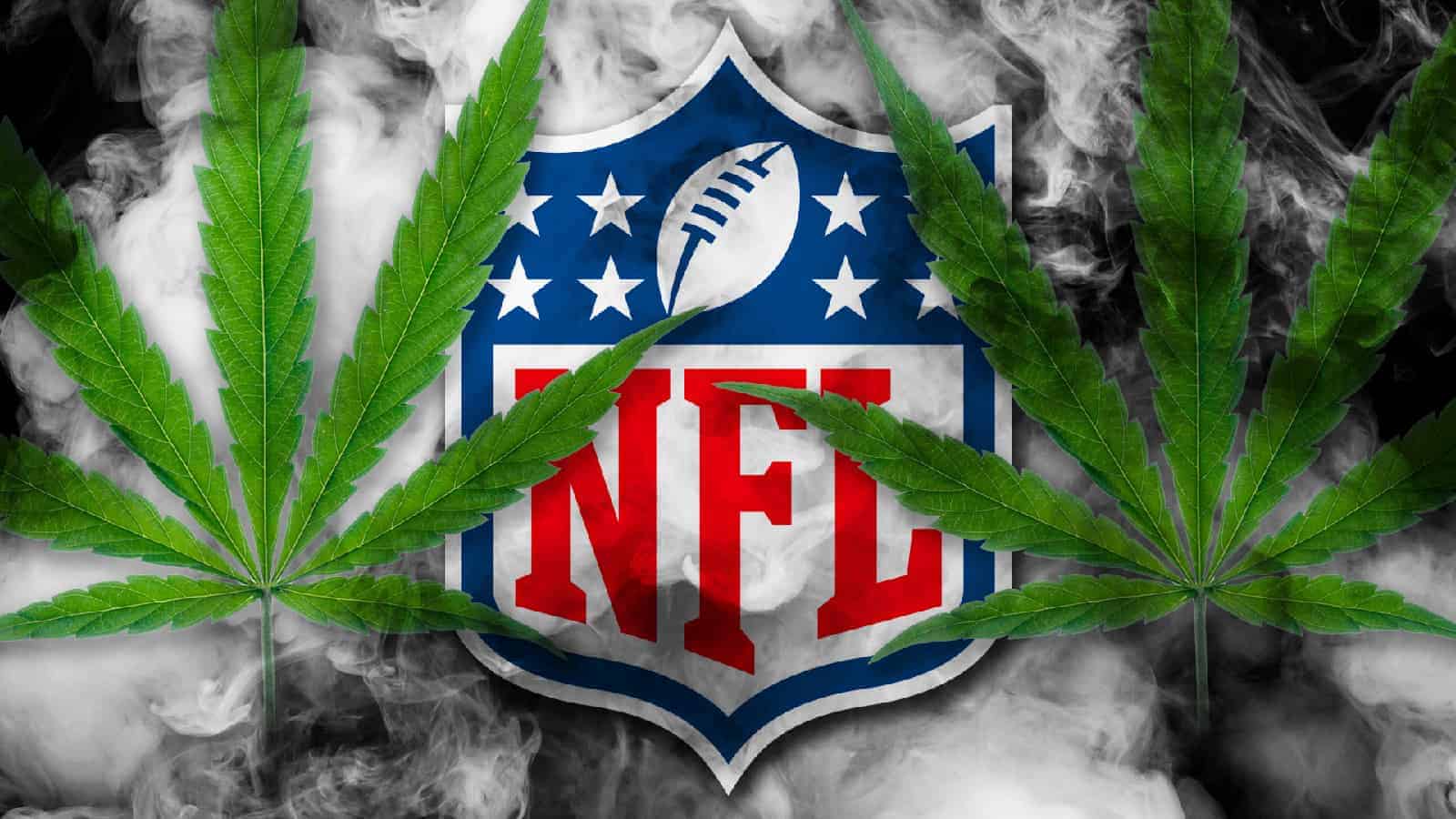Despite the pandemic imposing new challenges to how teams operate, there have been some big wins for professional football players. A new NFL weed policy means that the NFL will no longer test players for THC during the offseason. One small victory for cannabis and one big win for athletes looking for safer alternatives to painkillers and prescription drugs.
The first American football league was founded in 1920 as the American Professional Football Association. The inaugural season consisted of 11 teams, and by 1922 the current name — National Football League (NFL) — was solidified. Today, the NFL has 32 teams divided into two conferences, each with four divisions. Each year, the season closes with a 14-team playoff that ends with the Super Bowl championship game.
Every February, Super Bowl weekend is celebrated like an American holiday. Football fans gather together around a feast rivaled only by Thanksgiving dinner. Whether or not you enjoy football, many viewers tune in for the much-anticipated tradition of Super Bowl commercials.
A 30-second ad cost roughly $5.6 million in 2020, but with nearly 100 million viewers, the potential revenue is worth the price tag for many big businesses. All told, the NFL itself is a big business, having grossed $12 billion in revenue in 2020, although it was down from $16 billion in 2019 due to the restrictions related to the pandemic.
High Revenue, High Risk
With such a large fan base and deep pockets, it’s surprising that the NFL has had such a long-standing policy against the use of cannabis. Especially if it could provide medicinal value to its players. A recent Gallup poll puts those in favor of cannabis legalization at a staggering 68%. Yet, the NFL has not exactly been the most enthusiastic when it comes to embracing change.
For example, the NFL waited until other leagues, like the National Hockey League (NHL) and the National Basketball Association (NBA), adapted to sports betting before hopping on board. Likewise, the NFL needed a nudge from governing agencies before taking their players’ physical and mental condition seriously. It wasn’t until Congress frowned upon their safety protocols and treatment of concussions that they decided to take a more active approach.
A Progressive Appraoch
It’s no secret that traumatic brain injuries (TBIs) can lead to chronic traumatic encephalopathy (CTE), a progressive condition affecting the brain. It’s believed that CTEs are the result of repeated blows to the head with multiple cases of concussions. CTE is becoming more and more common among football players, boxers, and other athletes involved with contact sports. Studies have shown that the risk of dementia increases two to four times for people who experience repeated TBIs, and CTE can be fatal.
Studies show that marijuana can relieve symptoms associated with CTE, reducing dizziness, headaches, and inflammation. In addition, many cannabinoids, including THC and CBD, have neuroprotective properties which can help the brain heal after trauma.
Was the legislative and societal pressure coupled with undisputed scientific evidence the push that the NFL needed to revisit their cannabis policy? It seems that way after the latest revisions to a contract created between the NFL and the union that advocates for player’s rights.
The NFL’s Old Pain Management Protocols
Prior to 2021, NFL players were subject to random drug testing via urinalysis. Any player in violation of the strict no-cannabis policy would be subject to drug abuse courses, followed by multi-game bans, suspension, and eventually, expulsion from the league for repeated offenses. By upholding this policy year after year — despite massive waves of legalization nationwide — the NFL sends the message that smoking weed is wrong and punishable, potentially causing irrevocable damage to a player’s career if caught.
In addition to the value cannabis may provide to players healing from a concussion, marijuana’s therapeutic properties have extreme value in managing the chronic pain associated with such a high-impact sport. The alternative to this natural remedy has led many players to depend on the use of opioids for pain management. While unintentional, the NFL’s anti-weed policy sounds a lot like pro-painkillers.
Players on Painkillers
A physical injury on the football field is unavoidable to some degree. Not all players are going to tear an ACL or break bones. However, the damage done to ligaments, muscles, joints, and tendons is almost guaranteed at some point during a player’s career.
Brett Favre, the famous former quarterback of the Green Bay Packers, suffered severe injuries while playing football, including a separated shoulder and broken bones. The prescription? Opioids for pain management. The Hall of Fame player has since been quite open about his addiction to painkillers, admitting to consuming up to 15 Vicodin at once, which is essentially a month’s supply.
The Impact of Opioids
Favre is only one famous example of athletes battling an addiction to prescription drugs. Washington University conducted a survey commissioned by ESPN asking more than 600 retired players about their use of painkillers and prescription drugs. The results showed that 52% of players were using prescription opioids during their career in the NFL. Of that 50%, more than 70% claimed that they abused opioids during this time, and one in seven were still abusing opioids at the time of the survey.
Several stories corroborate the theory that sports doctors and athletic trainers contributed to this problem by overprescribing players to keep them on the field. The rate of addiction was never explained to players and ultimately led to a lawsuit filed against the NFL by roughly 1,600 former football players. Considering that 40,000 Americans die every year from opioid overdose, it’s absurd that the NFL took so long to reconsider its cannabis policy. But there’s still a long way to go.
A Headline: New NFL Weed Policy
For the first time, the NFL has updated its rules to no longer test players for cannabis use during the offseason. In fact, they have loosened their policies regarding cannabis across the board and have even decided to fund research to further study the effects of cannabis on chronic pain and injury management. Could the future of sports include prescribed cannabis therapy?
Collective Bargaining Agreement (CBA)
The CBA is arguably the most crucial document in the NFL. It’s essentially an operating agreement between the NFL and the National Football League Players Association (NFLPA) with detailed rules and regulations that both owners and players must abide by. It covers topics like the number of players on a roster, retirement plans, healthcare agreements, and what is considered grounds for suspension or termination.
Pain Management Research
To show that they are taking the existing research seriously as an alternative to opioids, the NFL is investing $1 million into medical cannabis research. The decision was made by the NFL’s pain management committee and the NFLPA in an effort to provide a more accessible, safe medicine for all players. Hopefully, research will support cannabis as a possible treatment for TBIs so the risk of CTE is significantly reduced for all players.
Offseason Provisions
On April 20, 2021, the revised cannabis policy in accordance with the updated CBA went into effect. As a result, players will not be tested for THC during the offseason (April 20 – August 9). In this window, players may consume cannabis as frequently as they like but can expect a two-week window of drug testing after training camp begins.
That said, should a player wish to consume cannabis, they need only stop use a few weeks before camp to remove any remaining THC metabolites from their system. As an added bonus, the limit for detection was increased from 35ng/ml to 150ng/ml.
Additionally, players would no longer be banned from play for a failed THC test. Instead, they will be fined the equivalent of three week’s worth of pay. This positive provision is one step closer to allowing football players to freely exist as cannabis consumers, as well.
Final Thoughts
The recent updates to the CBA are a win for weed. However, there is still a long way to go until all professional athletes are granted the freedom to consume cannabis liberally. For now, the win against the opioid epidemic may feel small. But, even one less overdose is a victory for the complete and total end of cannabis prohibition.




![[NJ] The Easiest Ways to Buy Weed in Buffalo A Full Guide (5)](https://neonjoint.com/wp-content/uploads/NJ-The-Easiest-Ways-to-Buy-Weed-in-Buffalo-A-Full-Guide-5-300x169.jpg)


